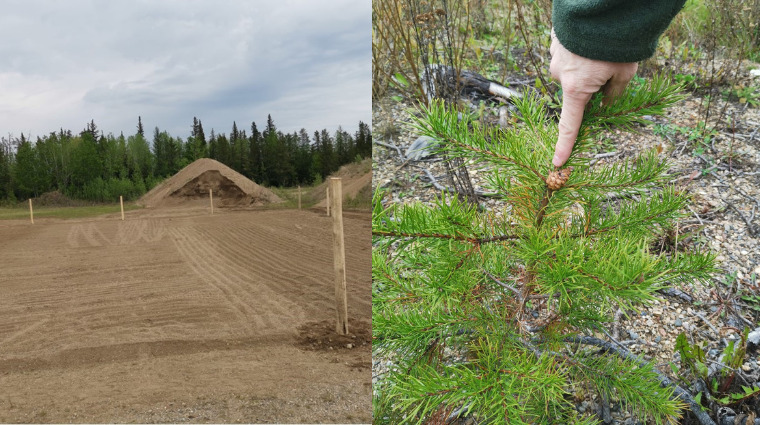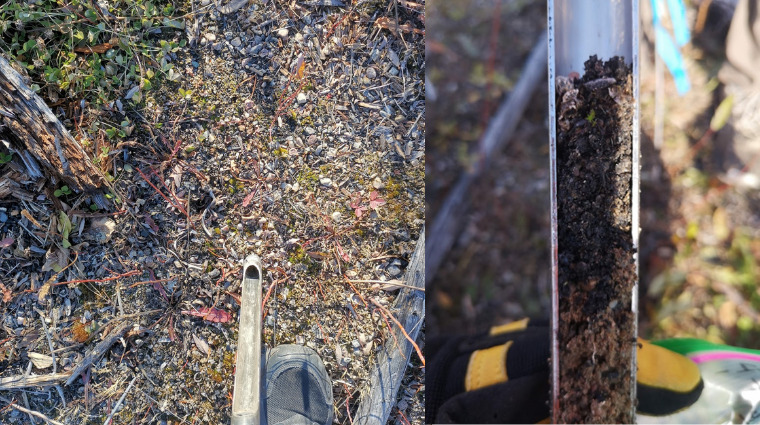
Collaborative, three-year applied research project uncovers unexpected results and provides student research experience
A Saskatchewan Polytechnic applied research project that was scheduled to last 10 weeks but instead expanded into a three-year project could lead to better soil across the prairies, including in the oilsands region where new tree growth is difficult.
“Project longevity yields rewards,” says David Halstead, professional biologist and research chair, School of Natural Resources and Built Environment. “This soil reclamation project resulted in two great collaborations with industry partners, Reclaimit and Airterra, provided applied research experience for several students, and resulted in very meaningful and unexpected project results. After three growth seasons we were able to create soil from what was originally nothing but sand and gravel.”
The project launched in the summer of 2019 when Halstead was approached by Reclaimit, a company focused on forest and land restoration, for assistance with a soil reclamation project. Reclaimit had recently conducted a soil reclamation trial on their own with very poor results. Andrew Carpenter, president of Reclaimit, came across the Hannin Creek Education and Applied Research Centre online, and reached out to Halstead for assistance.
“Our project with sandy soil was a failure and I wasn’t satisfied with the results,” says Carpenter. “I realized we needed more horsepower. I wanted to work with someone who had experience with the ecosystem and environment I work with. That’s where Sask Polytech comes in.”
A sandy gravel pit close to the Hannin Creek Centre at Candle Lake was chosen as the applied research site. The gravel pit mimicked northern oilsands deposits. A total of 600 seedlings were arranged in blocks with experimental treatments consisting of five different soil amendments including peat, fertilizer, hydro mulch, biochar and controls. In addition, woody debris, mycorrhiza, and both woody debris and mycorrhiza were added as secondary treatments. The applied research project was run for 10 weeks in the summer of 2019. The initial project was funded by Natural Sciences and Engineering Research Council of Canada (NSERC).
“Dave and his applied research team are really good listeners, they ask great questions and work very, very hard,” shares Carpenter. “I had to invest some of my own money along with the NSERC grant Sask Polytech applied for. When you are a small business and investing your own money into a research project, it’s rewarding to work with a team that is as excited about the research as you are.”
Although the initial project was short (one growing season), biochar was showing some very promising results. Biochar is pure carbon, a unique form of charcoal. The project was continued in 2020 with a focus on biochar as the key element supplied by Airterra. This project was funded by the National Research Council of Canada Industrial Research Assistance Program (NRC IRAP).

Working with Airterra, student researchers looked at different ways of treating the biochar. Sask Polytech came up with recipes to inoculate the biochar with organic material and informed Airterra and Reclaimit staff on how to prepare the biochar with organic material before adding to the test plots.
“This was an excellent opportunity to demonstrate a novel method of soil reclamation using a product that could potentially be highly beneficial for soil reclamation,” says Rob Lavoie, president and CEO of Airterra. “We are the first company to register a biochar soil product for use in Canada. We are excited to be a part of this innovative project.”
Sask Polytech found using biochar encourages a healthy soil microbiology and helps soil hold onto nutrients and moisture much longer.
Long term research that follows the trajectory of soil reclamation projects is extremely rare, so it was imperative to solicit funding for one more year. Fortunately, NRC-IRAP recognized the value of this opportunity and permitted Reclaimit to acquire a final year of growth and soil composition data in combination with Sask Polytech.
“After three years, we couldn’t believe the extent of the growth on some of the plots, the soil was showing high biodiversity. Trees were growing well, with some even sporting open pine cones,” says Halstead.
“Sask Polytech’s applied research team is helping us come up with real solutions for real problems. The goal of this project isn’t to plant trees in gravel pits. The health of a tree is only an indicator of what’s happening below the surface,” says Carpenter. “The goal is to fix the fundamental issue, which is to repair the broken soil. We need to restore the potential for the soil to heal itself. The results of this project are helping us work towards this important goal.”
Both ReclaimIt and Airterra agree working with Sask Polytech has been a great experience.
“We were blown away by Dave’s attention to detail,” says Lavoie. “Dave was highly instrumental in making the project a success from a funding perspective, students doing field work and promoting the methodology to the industry. We would love to work with Dave and Sask Polytech again in the future.”
“We could not have gotten to this position without the support of Sask Polytech,” says Carpenter. “Dave’s team is passionate, approachable, available and open to trying new things. They are very hard workers.”
Carpenter adds, “The results of this applied research project demonstrate credibility for my company. When I’m working with clients I am not simply sharing the scientific data, but my excitement about the many solutions that are being revealed due to the collaborative success of Reclaimit, Airterra and Sask Polytech.”
To learn more, visit saskpolytech.ca/research.
Published November 2021.
Saskatchewan Polytechnic is signatory to the SDG Accord. Sustainable Development Goal alignment is one of the ways Sask Polytech is leading the rise of polytechnic education.


